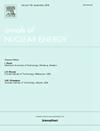基于深度学习的核反应堆运行综合过程控制性能增强
IF 2.3
3区 工程技术
Q1 NUCLEAR SCIENCE & TECHNOLOGY
引用次数: 0
摘要
本研究提出了一种混合智能比例积分导数(PID)控制方法,该方法根据瞬态严重程度动态调整比例(Kp)、积分(Ki)和导数(Kd)增益,以提高核反应堆的控制性能。通过运行在1mwth的热谱熔盐堆(MSR)的反应性插入和主泵故障瞬态来验证该控制方法。它利用基于深度学习的预测模型来估计功率峰值、峰值时间和功率斜坡率,作为暂态严重程度的指标,指导实时控制调整。为了确保预测的可靠性和准确性,采用不确定性量化(UQ)方法,包括深度集成、蒙特卡罗(MC) dropout和贝叶斯神经网络(BNN)最后一层来评估预测置信度。预测模型得到的结果与使用系统动力学分析工具(SDAT)模拟得到的结果一致。在所有模型中只观察到较小的不确定性。通过集成预测模型,提出的基于深度学习的PID控制器方法优于遗传算法调谐的PID控制器,特别是在减轻泵故障瞬态时的功率波动方面。研究结果证明了在瞬态条件下使用基于深度学习的PID控制方法保持反应堆稳定性和提高反应堆安全性的可行性和有效性。本文章由计算机程序翻译,如有差异,请以英文原文为准。
Deep learning-based enhancement of integrated process control performance in nuclear reactor operations
This study proposes a hybrid intelligent Proportional Integral Derivative (PID) control approach that dynamically adjusts proportional (Kp), integral (Ki), and derivative (Kd) gains based on the transient severity level to enhance control performance in a nuclear reactor. The control approach is demonstrated through reactivity insertion and primary pump failure transients in a thermal-spectrum molten salt reactor (MSR) operating at 1 MWth. It utilized deep learning-based predictive models to estimate power peak, time to peak, and power ramp rate, which served as indicators of transient severity and guided real-time control adjustments. To ensure reliability and accuracy, uncertainty quantification (UQ) methods, including deep ensembles, Monte Carlo (MC) dropout, and Bayesian Neural Networks (BNN) last layer, were applied to assess prediction confidence. Results obtained from the predictive models were aligned with results obtained from simulations using the System Dynamics Analysis Tool (SDAT). Only minor uncertainties were observed across all models. By integrating predictive models, the proposed deep learning-based PID controller method outperformed the genetic algorithm-tuned PID controller, particularly in mitigating power fluctuations during pump failure transients. The findings demonstrate the feasibility and effectiveness of using a deep learning-based PID control approach in maintaining reactor stability and improving reactor safety under transient conditions.
求助全文
通过发布文献求助,成功后即可免费获取论文全文。
去求助
来源期刊

Annals of Nuclear Energy
工程技术-核科学技术
CiteScore
4.30
自引率
21.10%
发文量
632
审稿时长
7.3 months
期刊介绍:
Annals of Nuclear Energy provides an international medium for the communication of original research, ideas and developments in all areas of the field of nuclear energy science and technology. Its scope embraces nuclear fuel reserves, fuel cycles and cost, materials, processing, system and component technology (fission only), design and optimization, direct conversion of nuclear energy sources, environmental control, reactor physics, heat transfer and fluid dynamics, structural analysis, fuel management, future developments, nuclear fuel and safety, nuclear aerosol, neutron physics, computer technology (both software and hardware), risk assessment, radioactive waste disposal and reactor thermal hydraulics. Papers submitted to Annals need to demonstrate a clear link to nuclear power generation/nuclear engineering. Papers which deal with pure nuclear physics, pure health physics, imaging, or attenuation and shielding properties of concretes and various geological materials are not within the scope of the journal. Also, papers that deal with policy or economics are not within the scope of the journal.
 求助内容:
求助内容: 应助结果提醒方式:
应助结果提醒方式:


